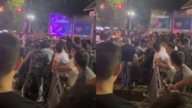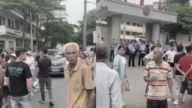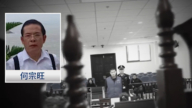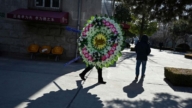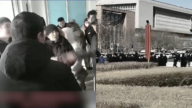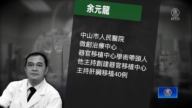【新唐人2013年06月12日訊】雖然中共法律規定,公民可以採用書信、電子郵件、傳真、電話、走訪等形式,向各級政府、或者縣級以上政府工作部門,反映冤情或者投訴請求等等。然而針對越來越多的上訪大潮,中共地方當局也建立了一套截訪、拘押、勞教或送精神病院等打壓的系統。大陸維權人士表示,當局不把群眾提出的問題解決掉,反而把提出問題的群眾解決掉。媒體認為,大多數上訪者絕望之後,可能「鋌而走險」。廈門公車爆炸案,爆出了「信訪難民」的絕境。
6月10號,信訪局官員宋軍亮發表文章說,實現「零進京上訪」,首要是靠嚴刑峻法。
有網友質疑,既然想要實現「零進京上訪」,那還在北京設甚麼國家信訪局?如果地方都依法執政了,民眾有冤可訴、有理可講的地方,誰還願意大老遠跑到京都來上訪?網友還說,廈門縱火案幾十條人命都沒有換來官家的反思,還要再堵訪民路,斷他們最後一點希望,這得有多麻木?
據《德國之聲》報導,廈門公車爆炸案,引發了人們對於上訪人群的關注。每年至少50萬人次的上訪者中,大多數人再也無法回覆正常生活,絕望之後或投身公益,或鋌而走險。
而北京維權人士胡佳認為,如果從最低的信訪單位算起,中國何止50萬的上訪者,每天500萬人還不止。他說﹕在中國,一個很簡單的冤案,當局不給解決,你就成為信訪者,然後在你不斷的信訪過程當中,反而把你當作一個問題給解決掉,比如動用拘留、勞動教養,甚至判刑、黑監獄等。
胡佳還表示,中國沒有司法獨立,沒有公正的司法體系,中國信訪制度就是依賴人治、黨治,加上共產黨的政法委,那麼法律與政法機關,隨時都可能被共產黨拿來當作開私刑的地方,警察搖身一變就是土匪。
北京維權人士胡佳:「信訪不會解決任何問題,而且我確實也覺得老百姓被信訪局騙了幾十年了,很多人,訪民後來都知道這個東西沒意義,必須根本性的改變這個國家的體制。」
中國「權利運動」組織負責人胡軍:「因為我們知道,你要上訪的話,首先要對中共這個體制產生了質疑,你就要求公正,可是這個體制對它提出質疑,說它不好,它就把你定為反對政府,不穩定份子。當你需要去尋找公正的時候,當你需要去尋找正義、尋找真相的時候,那麼你在這個體制、這個環境下,你就已經成為中共的罪犯。」
6月7號,福建廈門快速公交車爆炸案,警方在24小時內宣稱﹕死者之一的訪民陳水總是唯一涉嫌縱火者。不過,當局卻下達禁令,要求各大媒體「不派記者採訪,已派出的撤離」,其中疑點重重,令不少民眾對此表示質疑。
北京維權人士胡佳:「中國政府的這些方面,拉個替罪羊,這些火速破案,這些方面都很難講的,所以我只能說,在這次廈門事情裡邊,確實可能有一個信訪戶,也死去了,他是否是縱火者,我們現在也不知道。」
據報導,中國很多訪民在經歷了被推諉、辱駡、毆打、勞教和酷刑之後,大多身體殘疾、精神困頓,再也無法回覆正常的生活。大批上訪者在北京及各省會城市淪為「信訪難民」,過著極其貧困的生活。絕大多數人抱著微弱的希望,終身陷入上訪與截訪的迴圈之中,直到「死在北京、自然結案」。
胡佳:「去年在我們通州區裡邊,在兩會期間就發生這樣的事情,通州區南街那個地方,有一個上訪戶就跟當地的村委會的書記,他把門反鎖上,然後身上淋著汽油抱住那個人,把那個人給燒死了,兩個人都死了,你把老百姓逼的無路可走,那麼老百姓只好去做楊佳了。」
胡佳表示,他身邊很多訪民已經看透信訪辦的真面目,決定放棄這種重復循環、無止盡的上訪路,選擇走上「不歸路」。
採訪/田淨 編輯/黃億美 後製/郭敬
Xiamen Bus Bombing Unveils Chinese Petitioner Desperation
According to law, Chinese citizens have the right to file
grievances or complaints to local or central authorities.
They can do so through letters, email,
fax, telephone and personal presence.
Today, China is seeing a growing
number of petitioners nationwide.
Chinese Communist Party (CCP) authorities at all levels
have responded with establishing a crackdown system.
It consists of intercepting petitioners,
detention, sending them to reeducation
-through-labor camps or mental hospitals.
Rights activists highlight that the CCP authorities
have viewed these petitioners as a “problem”.
They have tried to make them disappear.
Media comment that the vast majority of petitioners take
risks, after being pushed into a corner, becoming desperate.
The Xiamen bus bombing has mirrored a real-life
extreme faced by China’s “petitioning refugees”.
On June 10, Song Junliang, an official from the
State Bureau for Petitioning, published an article.
He stated that the realization of “zero travel to Beijing for
petitioning” shall primarily impose harsh punishments.
A netizen asked, that “if the authorities aim to achieve
『zero travel to Beijing for petitioning’, why is the
State Bureau for Petitioning headquartered there?
If local authorities implement rule-of-law governance,
will those petitioners be willing to travel from distant
regions to Beijing, to seek justice against grievances?”
Another netizen wrote, that “the bus arson
in Xiamen has caused dozens of deaths.
However, it still fails to incite the authorities’ introspection.
Now they simply continue to block
petitioners, and break their slim hopes.
How numb have these officials become now?”
Deutsche Welle reported that the Xiamen bus bombing
has brought the public’s focus onto the petitioner groups.
Each year, China sees at least 500,000
petitioners travel, in order to seek justice.
The vast majority of them have thus lost their normal life.
In despair, they may devote themselves
to defending civil rights, or take risks.
Hu Jia, a rights activist in Beijing, estimates
that the actual number of petitioners in
China has exceeded 5 million per day.
He says that today in China, a simple injustice
can force a citizen to become a petitioner.
In their later process of petitioning, the petitioner becomes
“a problem” that the CCP authorities then try to remove.
He/she may be detained, sent to the reeducation-
through-labor camps, put in prison or in a black jail.
Hu Jia adds that China has no independent
judiciary, nor has an impartial judicial system.
China’s petitioning system is based on the
rule of the CCP, of its officials, and of its
Political and Legislative Affairs Committee.
The law and judiciary organs in China can be
used at the discretion of the CCP at any time.
So it’s no surprise that the police can change
suddenly to be bandits, according to Hu Jia.
Hu Jia: “Petitioning actually solves nothing.
I think that for decades, those ordinary folks who pinned
their hopes on petitioning have been fooled by the CCP.
Lots of petitioners have now realized
that petitioning helps them with nothing.
The only solution is making a
radical change in China’s politics.”
Hu Jun, NGO Founder, Human Rights Campaign in China:
“Petitioning means that you have questioned
the CCP political system by seeking justice.
The doubts you have raised may easily put you at
risk of being accused of subversion of state power.
Thus, when you try to seek justice, to find the truth,
you’ll naturally become a ‘criminal’ for the CCP.”
On June 7, a fatal bus bombing occurred in Xiamen.
Within 24 hours, local police authorities announced
that the only criminal suspect was a petitioner.
Meanwhile, the CCP authorities issued an
order, regarding media reporting of the incident.
All major reporters are banned
from going to take local interviews.
All those who have arrived at
the scene are required to leave.
The public have found the official allegations dubious.
Hu Jia: “The Chinese authorities find a
scapegoat, or announce a quick case solving.
This may involve complicated factors.
What I can say is that there was probably
a petitioner at the scene, who also died in fire.
But whether he was the arsonist or not, we don’t know.”
Reportedly, after being abused, beaten, jailed
and tortured, lots of Chinese petitioners are
no longer able to continue their life as before.
Seeking injustice has turned large numbers
of petitioners into “petitioning refugees”.
They reside in Beijing and other
capital cities, living in extreme poverty.
The vast majority of them have held a ray
of hope, and spent their whole life in a
cycle of petitioning and being intercepted.
The cycle usually ends up with their death,
and their cases are “naturally closed”.
Hu Jia: “During the 2012 Two Session, in
Beijing’s Tongzhou district, a petitioner doused
himself with gasoline, and set himself ablaze.
He grabbed a Party chief of the
local village, and both died in fire.
When ordinary people are driven into a
corner, they have to become another Yang Jia.”
Hu Jia says that so far, many petitioners
he has known have discerned the true
colors of the CCP petitioning offices.
They have decided to withdraw from
the endless cycle of petitioning.


